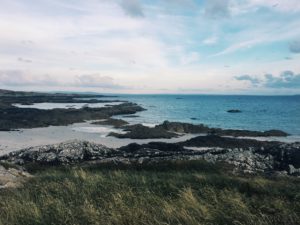As I have been learning Irish, I wondered why I would possibly need so many words to say “wonderful,” “awesome,” or “amazing.” On my first day of class alone, when discussing how to reply to the question “How are you?”, Mary gave us 3 different ways to reply that we were wonderful. “Tá mé go hiontach,” “Tá mé ar fheabhas,” “Tá mé go dial.” I couldn’t possibly convince myself that I would need to learn more than just one way to say that anything was wonderful, so I stuck with the standard “go hiontach” and that was it. And in the permacloud of South Bend with a pre-lunchtime class, the answer to “conas atá tú?” was usually not much more than “go maith” (good), “tuirseach” (tired) or “tá ocras orm” (hungry). Iontach was dropped into my writing occasionally, but never overused.


Now that I’m in An Cheathrú Rua, I’ve found that I have, indeed, overused the word “iontach.” I added “ar fheabhas” to my vocab and even that was becoming overused. Our teacher begged us for some variety in our adjectives. I know understand why the Irish needed so so many words for wonderful. I’ve since added “thar cionn,” “thar bearr,” and “ar dóigh.” If I’m asked “cén chaoi bhfuil tú?” I could answer with “Tá mé ar muin na muice” – translated to “I am on the pig’s back” – translated to “I’m wonderful.”
How are you?
Tá mé ar muin na muice
How was the trad session last night?
Bhí sé ar fheabhas
How was the beach?
Thar bearr
Although so many aspects of the Irish language still confuse me to no end, their vocabulary makes more sense as I live through it. Not everything can be ar fheabhas, and since so many things are indeed “wonderful,” I have to expand my vocabulary.
Their 50 or so words for types of rain are more logical as I must describe the difference between the different types of ways I get rained on during my long walks to town. And while I doubt I will ever learn each of the different words for the Ireland rain, I can imagine what creative description the Irish have for the type of rain falling.
One of my proudest moments so far in this program happened at one of the (two) local pubs. One of the people in the program is well known around the town after attending the program nearly 20 years ago (he even adopted an entirely new Irish name), and one of his friends joined our table. His friend was nearly fluent but wasn’t a native speaker, which was probably why I found it easier to understand him. I was able to hold conversation with him for over an hour, mostly all in Irish. If ever I was unsure of whether I got my point across and translated to English to make sure, he would say “Don’t translate, don’t translate, tuigim,” (I understand). Even if I wasn’t forming the most academic of sentences, I was communicating. At one point he even tested my grammar going around and having me change the pronouns for first person, second person, third person, plural / single, etcetera. It was an easy lesson, but he was very impressed with my Irish. Each time I would stop speaking, he would tell me to keep going, saying that it didn’t matter what I said, so long as it was in Irish. When I ran out of things to say I introduced everyone at the table as Gaeilge or just started saying random things, but all they want is for people to learn the Irish language. It was so encouraging to see that my communication abilities exceeded my relative confidence in them.
Tomorrow, we will be taking a trip to one of the Aran Islands, so my next blog post will hopefully be full of more amazing pictures of this beautiful country. Slán go foill!


